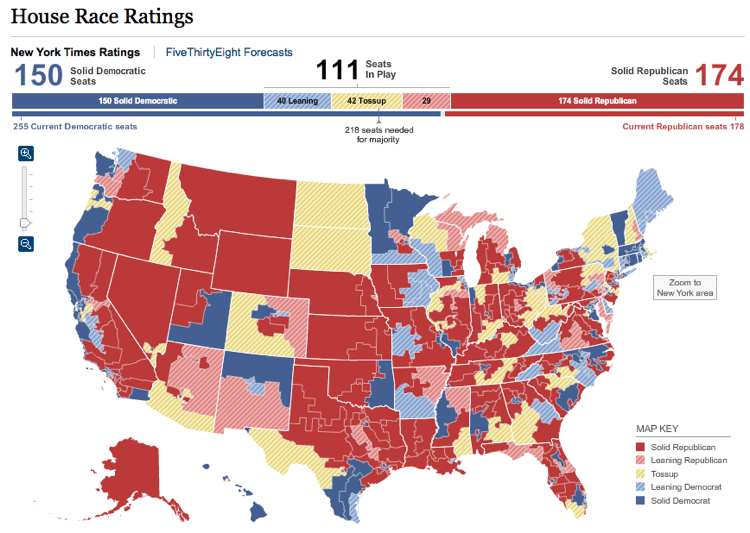
According to the U.S. Census Bureau, there are roughly 210 million or so eligible voters in the United States. In 2008, 63% or 131,000,000 voted in the Presidential election. The 2010 midterms saw this number fall to just 89 million, which translates to about 40% voter turnout. This kind of lower turnout is normal for midterm elections, but nevertheless it means that a substantial amount of citizens stayed at home, either those who voted in 2008 and those who did not.
Does a 40% minority of eligible voters represent the "will of the American people"? No, not really. Not at all, actually, when one examines a bit further who of this 40% voted.
According to exit polls, embarrassingly low amounts of young people and minorities exercised their democratic rights this past November. Millions of Obama supporters, who had helped elect him in 2008, stayed home. 29 million or so, to give an estimate. On top of that, 13% of people who had voted for Obama in 2008 switched sides and voted Republican in 2010. As well, the people who did vote tended much more strongly to be middle-aged or senior citizens, white, and conservative or at least Republican-leaning. Many self-proclaimed moderates also favored the Republicans more so than Democrats.
This older, more homogeneous, more Republican demographic that turned out returned to the Republicans previously conservative strongholds that had swung to Obama and the Democrats in 2008, as well springing a few surprises on established Democratic incumbents, like in Illinois and Wisconsin. Indeed, the more fiscally conservative and moderate Blue Dogs lost half of their seats to Republicans in districts that had gone to the Democrats in the previous election.
The reasons for why so many Obama supporters and Democratic voters either didn't show up or voted Republican can be discussed in a separate article. The main question is what the most important issue was to those who bothered voting, and the answer is overwhelmingly because of the poor state of the economy. It's clear that few Americans have much faith, if any, in Congress and that President Obama's fiscal policies have not done enough to spur economic growth. Despite some neo-conservative claims that voters were rejecting the Democrats' and Obama's liberalism, the fact is that most people didn't consider the President's policies when deciding for whom to vote. 63% of voters said the economy was the most important issue to them, and those who said so voted 54% to 43% for the Republicans.
So moderate voters went more for Republicans to see if they could fix the economy any better than the Democrats had for the past 2 years (no doubt unaware, unwilling to recognize, or uncaring that the Republicans had in the most dickish fashion possible blocked and obstructed any and every form of economic assistance put forth by the Democrats). Republican voters unsurprisingly voted for Republicans, which combined with the moderate voters' economic concerns and liberal disillusionment with President Obama and the Democrats to hand the GOP a huge political win.

Pretty straightforward, really. The 2010 midterms seemed to be more a fragmented, haphazard display of the American two-party system, albeit accidentally. Of course, there are also the plutocratic reasons for the GOP victory: Some voters might have thought evil things about government, health care, Obama, the deficit, etc. But in American politics, money talks and money largely went with the Republican party; conservative organizations outspent liberal ones 2-1, and large special-interest industries bankrolled Republican campaigns. This was the most expensive midterm election ever, with over $4 billion spent; is it surprising that special-interests, corporations, and Big Money industries spent large amounts of cash on politicians who were far to the right of the President's mildly liberal rhetoric of reform?
A representative democracy should reflect the wants, needs, and opinions of the populace; American democracy increasingly is representative of only a small portion of population, either through plutocracy or voter apathy as a indirect result of plutocracy. The will of conservatives is certainly clear now; they demonstrated that simply by showing up at the polls, something that liberals and Democrats did not nearly do enough of to hold back the Right. Conservatives clearly want less government spending, lower taxes, a repeal of healthcare, blah, blah, blah. But what does the rest of the country want? What do the vast majority of Americans want? Not what the GOP is selling, that's for sure.
What does this mean for the future? The Republicans can no longer simply oppose any and everything the Democrats propose for the purpose of painting the President a failure...or maybe they can. They may try to throw some meat to their base and repeal health care, but that is extremely unlikely to pass. They may end up compromising with Democrats on certain issues, and be obstructionist and irresponsibly selfish on other subjects, which very well could end in a suspension of the government. Such a fiasco would unquestionably harm the country, but this is what people voted for and what they may receive.
At a time of deep economic crisis, the United States requires leadership, responsibility, cool heads, and sensibility. Unfortunately, it does not appear that the people will get this with the incoming group of Republicans, but time will only tell.
No comments:
Post a Comment